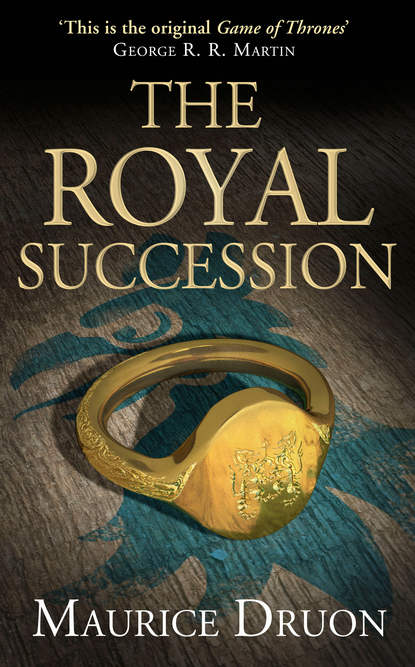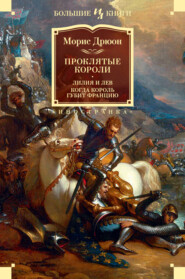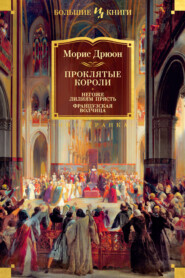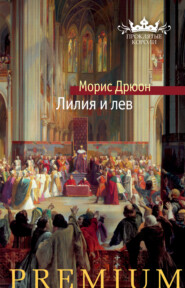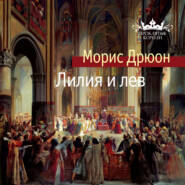По всем вопросам обращайтесь на: info@litportal.ru
(©) 2003-2025.
✖
The Royal Succession
Автор
Год написания книги
2019
Настройки чтения
Размер шрифта
Высота строк
Поля
‘In the first place those committed by the clergy. We must begin by reforming ourselves before we undertake to reform others. Our Holy Mother is too tolerant of shortcomings and abuses. Thus, neither holy orders nor priesthood may be given to men who are mutilated or deformed. And yet, the other day, I saw a certain Abbé Pierre, who is with Cardinal Caetani, with two thumbs on his left hand.’
‘A little hit at our old enemy,’ thought Poitiers.
‘I have made inquiries,’ Duèze went on, ‘and it appears that the halt, the maimed and the eunuchs who conceal their misfortune beneath a habit, and indeed are beneficed by the Church, are legion. Are we to cast them from our bosom rather than efface their fault, reduce them to penury and perhaps throw them into the arms of the heretics of Toulouse or similar religious confraternities? Let us permit them rather to redeem themselves; and to redeem is to pay.’
The old prelate was perfectly serious. His imagination, stimulated by his meeting with the Abbé Pierre, had created, during these last nights, a complete and precise system on which he intended writing a memorandum to be submitted, so he modestly said, to the next Pope.
It was to create a Holy Office of Penitentiary, which would bring in revenue to the Holy See from bulls of absolution of all kinds. Mutilated priests might obtain absolution at the rate of a few livres for a missing finger, twice as much for a lost eye, and the same for the absence of one or both testicles. A priest who had castrated himself would have to pay a higher price. From bodily infirmities Duèze passed to those of the soul. Bastards who had concealed their condition when receiving orders, priests who had taken the tonsure though married, priests who married secretly after ordination while it was still current, priests who lived unmarried with a woman, priests who were bigamists, or incestuous, or sodomites, would all be taxed proportionately to their sin. Nuns who had wantoned with several men, either within or without their convent, would be subject to particularly costly rehabilitation.
‘If the creation of this Penitentiary’, declared Duèze, ‘does not bring in two hundred thousand livres the first year, I’ll be …’
He was going to say ‘I’ll be burnt’, but stopped in time.
‘At least,’ thought Poitiers, ‘if he’s elected, I shall have no need to be concerned for the papal finances.’
But in spite of all Duèze’s manoeuvres, and in spite of the support Poitiers gave him secretly, the Conclave still marked time.
Moreover, the news from Paris was far from good. Gaucher de Châtillon, making common front with the Count of Evreux and Mahaut of Artois, was doing his best to put a brake on Charles of Valois’s ambitions. But Charles was living in the Palace of the Cité, where he had Queen Clémence at his mercy; he was running affairs as he pleased, and sending out to the provinces instructions contrary to those sent by Poitiers from Lyons. Moreover, the Duke of Burgundy had arrived in Paris, on the 16th of June, to establish his rights; he knew that he had the support of the vassals of his huge duchy. France, therefore, had three regents. This situation could not continue for long, and Gaucher asked Philippe to return to Paris.
On the 27th of June, after a restricted council meeting, attended by the Count de Forez and the Count de la Voulte, the young Prince decided to set out as soon as possible, and ordered his escort’s baggage-train to be assembled. At the same time, learning that no solemn mass had yet been held for the repose of his brother’s soul, he ordered masses to be said on the following day, before his departure, in every parish in the town. All the high and low clergy were expected to attend to join their prayers with the Regent’s.
The Cardinals, particularly the Italians, were delighted. Philippe of Poitiers was being compelled to leave Lyons without having made them give way.
‘He is concealing his flight under the pomp of mourning,’ said Caetani, ‘but let him go all the same, that accursed young man. He thought he held us in the hollow of his hand. I assure you that we shall be back in Rome before the month is out.’
5 (#ulink_88d08444-9d1c-5787-b073-d86ac6a11889)
The Gates of the Conclave (#ulink_88d08444-9d1c-5787-b073-d86ac6a11889)
CARDINALS ARE IMPORTANT PEOPLE who must not be mixed with the small fry of the clergy. The Count of Poitiers had ordered that the church of the monastery of the Predicant Friars, called the Church of the Jacobins,
the most beautiful, the largest, after the Primatial Saint-Jean, and also the best fortified, should be reserved to them for the service to the memory of Louis X. The Cardinals saw in this selection no more than normal respect for their dignity. None was absent from the ceremony.
They numbered but twenty-four and yet the church was full, for each Cardinal was escorted by his whole household – chaplain, secretary, treasurer, clerks, pages, valets, linkmen and trainbearers: nearly six hundred people in all were assembled between the massive white pillars.
Rarely had a funeral mass been followed with so little peaceful meditation. It was the first time for many months that the Cardinals, who had been living in cliques in separate residences, had found themselves all gathered together. Some had not seen each other for nearly two years. They watched each other, quizzed each other, commented on each other’s actions and appearance.
‘Did you see that?’ someone would whisper. ‘Orsini has greeted the younger Frédol. Stefaneschi has been talking for quite a while to Mandagout. Are they rallying to the Provençaux? But Duèze doesn’t look at all well; he’s grown much older.’
And, indeed, Jacques Duèze was making an effort to control his youthful lightness of foot, and walked in with slow step, replying to greetings vaguely, as if he were already detached from this world.
Guccio Baglioni, dressed as a page, formed part of his suite. He was supposed to speak nothing but Italian and to have come straight from Sienna.
‘Perhaps I should have done better,’ thought Guccio, ‘to have put myself under the Count of Poitiers’s protection, for I should certainly have gone back to Paris with him today and I should have been able to make inquiries about Marie, of whom I have had no news for so long. Instead of which, here I am, entirely dependent on this old fox, to whom I have promised my uncle’s money, but who will do nothing for me till the money has arrived. And my uncle does not reply. They say that Paris is in turmoil. Marie, Marie, my beautiful Marie! She’ll think I’ve abandoned her. Perhaps she even hates me now? What have they done with her?’
He imagined her shut up at Cressay by her brothers, or in some convent for Magdalens. ‘Another week like this, and I shall go back to Paris.’
Duèze turned every now and then to look behind him with a curiously alert expression.
‘Are you afraid of something, Monseigneur?’ Guccio asked.
‘No, no, I fear nothing,’ replied the Cardinal, who began secretly observing his neighbours.
The redoubtable Cardinal Caetani, with his thin face divided by a long aquiline nose, and his hair which seemed to shoot out like white flames from the edge of his red skull-cap, made no attempt to conceal his triumph. The catafalque, symbol of Louis X’s death, corresponded in his mind to the waxen doll, pierced with pins, with which he had cast a spell. The glances he exchanged with his following, the Abbé Pierre, Father Bost and the clerk Andrieu, his secretary, were those of victory. He wanted to say to all those present: ‘This, Messeigneurs, is what happens when you attract the vengeance of the Caetani, who were already powerful at the time of Julius Caesar.’
The two brothers Colonna, each heavy chin divided by a vertical cleft, looked like warriors disguised as prelates.
The Count of Poitiers had not economized on the choir. There were a full hundred of them, their voices sounding above the organ, which had four men pumping at its bellows. A royal, reverberating music echoed among the vaults, saturated the air with vibrations, and enveloped the crowd. The junior clerks could gossip among themselves with impunity, and the pages laugh or mock their masters. It was impossible to hear what was being said three paces away, and still less what was taking place at the doors.
The service came to an end; the organ and the choir fell silent. Both wings of the great door stood open; but no daylight penetrated into the church.
Suddenly, the Cardinals understood; and an angry clamour broke out. A brand-new wall blocked the doorway. During the mass, the Regent had bricked up the exits. All occurred during the ceremony, obscuring the sun. The Cardinals were prisoners.
There was a fine panic; prelates, canons, priests and valets, all mingled together, ran to and fro like rats in a trap. The pages, climbing on each other’s shoulders, hoisted themselves up to the windows, from where they shouted: ‘The church is surrounded by armed men!’
‘What are we going to do, what are we going to do?’ groaned the Cardinals. ‘The Regent has played a trick on us.’
‘That’s why he favoured us with such loud music!’
‘It’s an attack on the Church. What are we going to do?’
‘We’ll excommunicate him,’ cried Caetani.
‘But what if he starves us to death, or has us massacred?’
The two brothers Colonna and the people of their party had already armed themselves with heavy bronze candelabra, benches and processional maces, determined to sell their lives dearly. The Italians and the Gascons were already beginning to hurl reproaches at each other.
‘All this is your fault,’ cried the Italians. ‘If you had only refused to come to Lyons. We knew some dastardly trick would be played on us.’
‘If you had elected one of us, we should not be here now,’ replied the Gascons.
‘It’s your fault, you bad Christians!’
They were almost on the point of coming to blows.
One door alone had not been entirely blocked; barely room for a man to pass through had been left, but the narrow opening was a hedge of pikes held in iron gauntlets. The pikes lifted and the Count de Forez, in armour, followed by Bermond de la Voulte and a few more armed men, entered the church. They were received with a volley of threats and obscene insults.
His hands crossed on the hilt of his sword, the Count de Forez waited till the clamour died down. He was a strong, courageous man, unmoved by threats or entreaties, profoundly shocked by the example the Cardinals had given during the last two years, and prepared to go to any length to obey the Count of Poitiers’s instructions. His rugged, wrinkled face appeared through his open visor.
When the Cardinals and their people had grown hoarse, his voice rang out over their heads, precise and emphatic, reaching to the end of the nave.
‘Messeigneurs, I am here on the orders of the Regent of France to ask you to devote yourselves henceforth solely to electing a Pope, and to inform you that you will not leave here until that Pope is elected. Each Cardinal may keep with him only one chaplain and two pages or clerks of his choice to serve him. Everyone else will leave.’
The Gascons and the Provençaux were no less indignant than the Italians.
‘It’s a felony!’ cried Cardinal de Pélagrue. ‘The Count of Poitiers promised us that we should not even have to go into seclusion, and it was because of it that we agreed to meet him at Lyons.’
‘The Count of Poitiers’, replied Jean de Forez, ‘was then speaking in the name of the King of France. But the King of France is dead, and it is in the name of the Regent that I am speaking to you today.’





